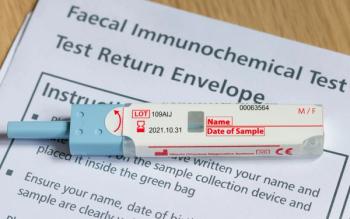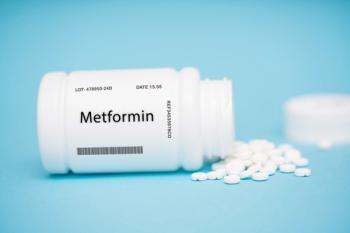
Colorectal Cancer
Latest News
Latest Videos
CME Content
More News

A randomized trial finds that default mailed outreach outperforms active choice strategies for initiating colorectal cancer screening in young adults.

Data from the 2021 National Health Interview Survey showed racial/ethnic differences in colorectal cancer screening were due to demographic and socioeconomic factors, except for low colonoscopy use in Asian individuals.

In a large fecal immunochemical test-based screening program, high adenoma detection rates lowered interval colorectal cancer (CRC) incidence and mortality, but not CRC-specific survival.

A New Zealand study finds patients are open to remote and general practitioner-led care when it is tailored to their needs.

The study aims to build an accurate, interpretable model for stage III colorectal cancer prognosis.

Patients and providers find the Colon Age tool acceptable and useful for individualizing colorectal cancer risk and encouraging earlier screening.

New insights highlight clinician support for shared survivorship care and identify key factors for effective implementation.

Metformin use may enhance progression-free survival (PFS) in patients receiving first-line systemic therapy for patients with metastatic colorectal cancer.

Why is colorectal cancer affecting more young people, and what can be done to prevent it?

Widespread noncompliance with federal cost-sharing rules exists, particularly impacting Medicare beneficiaries and patient-preferred prep options, study finds.

Early circulating tumor DNA (ctDNA) changes predict survival in mismatch repair or microsatellite instability–high (dMMR/MSI-H) metastatic colorectal cancer (mCRC) treated with immune checkpoint inhibitors (ICIs).

Initiating fecal immunochemical test (FIT) screening before age 50 can significantly reduce colorectal cancer incidence and mortality, according to one study.

Dirk Arnold, MD, PhD, medical director, Asklepios Tumour Biology Centre, discusses the trial design of a study comparing amivantamab with standard chemotherapy to potentially improve treatment outcomes.

Structured exercise programs should be a part of the standard of care for colon cancer following adjuvant chemotherapy, authors of the CHALLENGE study recommended.

A circulating tumor DNA (ctDNA) blood test demonstrated high sensitivity and specificity for colorectal cancer (CRC) detection in a large average-risk population, study finds.

Fecal immunochemical testing (FIT) was more accurate than blood-based testing for detecting advanced precancerous colorectal lesions, a comparative study found.

A novel machine learning model enhances colorectal cancer (CRC) prognosis and immunotherapy response prediction by integrating clinical data and immune gene expression.

Patients with chronic conditions are less likely to be diagnosed via screening and face higher mortality when cancer is detected in emergency settings, according to one study.

Study findings show ChatGPT-4o provides accurate, complete, and trustworthy responses to patient-generated colorectal cancer (CRC) screening questions.

Investing in patient navigation and clinician incentives ensures colorectal cancer screening completion, improves early detection, reduces disparities, achieves cost savings, and advances population health for all stakeholders.

Ongoing mortality gaps persist among Black and American Indian/Alaska Native patients with colorectal cancer, despite some overall improvements.

A new analysis links higher triglyceride-glucose (TyG) and TyG–body mass index (TyG-BMI) levels to increased colorectal cancer (CRC) risk, especially among women, but not mortality.

Emerging research highlights how vitamin D boosts immunity and reduces colorectal cancer (CRC) risk by regulating inflammation and cell growth.

There has been a sharp increase in colorectal and pancreatic cancer rates among Americans under 55 years, despite declines in older adults, according to a new study.

Findings from a new study reveal how hurricanes and the pandemic disrupted colorectal cancer (CRC) screenings in Puerto Rico, leading to a rise in late-stage diagnoses.












